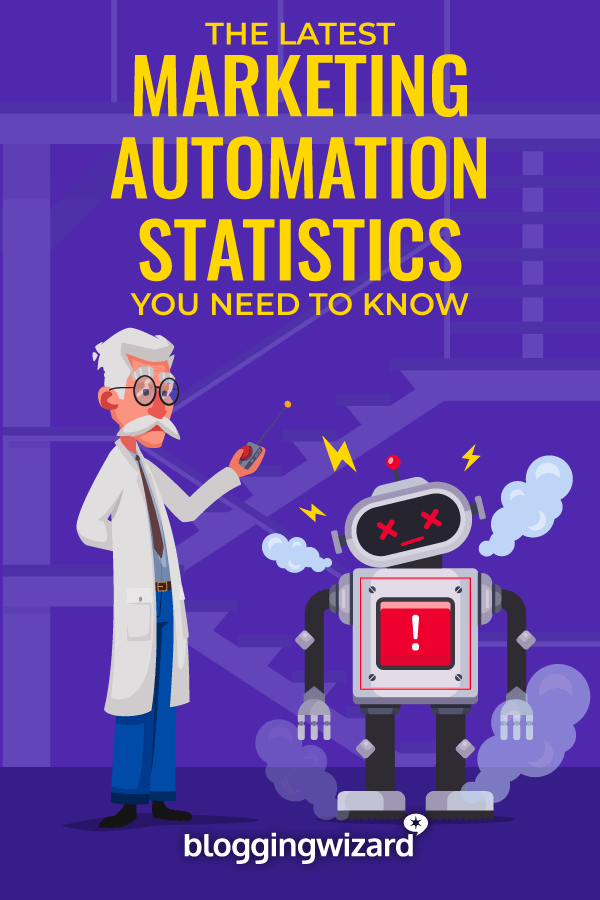26 Marketing Automation Statistics, Facts & Trends For 2024

What are the latest marketing automation statistics?
Marketing automation is helping companies with content marketing, social media marketing, lead nurturing and more.
We wanted to know how companies feel about the marketing automation industry, whether or not they’re using this technology, how companies are using marketing automation, and what marketing automation software companies are using.
So, we compiled a list of the latest marketing automation statistics from recent reports.
We cover general marketing automation statistics, goal-based marketing automation statistics, usage statistics and more.
Marketing automation statistics – editor’s picks
- In the United States the market size for marketing automation has surpassed $4.62B. (Emergen Research)
- Marketing automation is used heavily by 83% of businesses with large marketing budgets. (Pedalix)
- 71% of marketers are actively using marketing automation for email marketing. (Act-On)
- 61% of marketers use Google Analytics to track social media metrics. (HubSpot)
- 26% of B2B companies handle marketing automation in house. (Pedalix)
General marketing automation statistics
1. The marketing automation market size has surpassed $4.62B in the United States
According to research firm Emergen Research, the market size for marketing automation reached $4.62B in the United States alone in 2021.
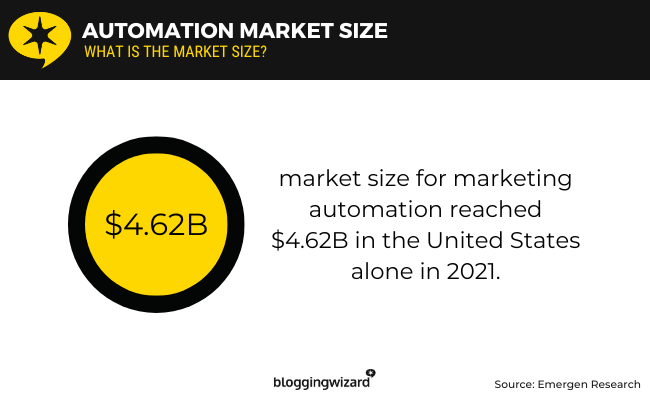
They also found that the technology has a compound annual growth rate (CAGR) of 12.5%.
This means the market size for marketing automation will reach $13.32B by 2030.
Source: Emergen Research
2. 98% of marketers say marketing automation is vital for success
Adobe’s survey of 600 marketing professionals, who included heads of marketing, vice presidents, directors and managers, found that 98% of marketers find marketing to be “very important or extremely important to success.”
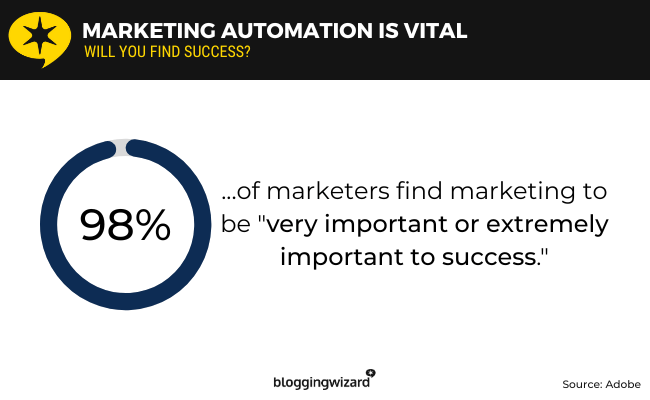
Source: Adobe
3. 37% of marketers think marketing automation is a very relevant marketing technology
Pedalix surveyed over 460 companies on B2B marketing automation.
37% voted marketing automation as being a very relevant marketing technology.
28% think it’s somewhat relevant while 14% think it’s somewhat irrelevant and 21% don’t use marketing automation at all.
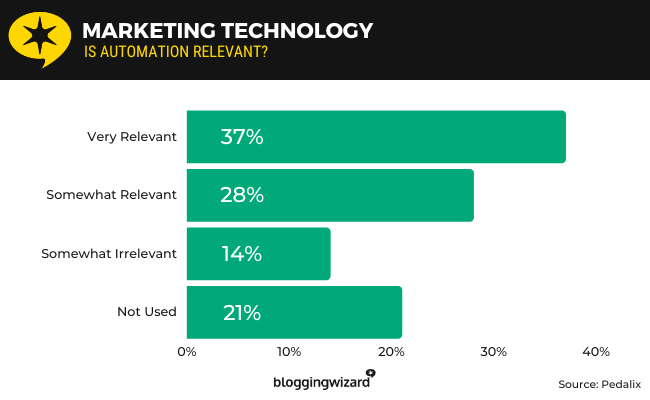
Marketing technologies voted as being more relevant than marketing automation included customer relationship management (54%), email marketing (52%) and search engine marketing (50%).
Marketing technologies voted as being less relevant than marketing automation included social media marketing (35%), digital analytics (35%), content marketing (33%) and ecommerce (21%).
Source: Pedalix
4. 83% of businesses with large marketing budgets use marketing automation heavily
In Pedalix’s survey of more than 460 B2B companies, they found that 83% of businesses with marketing budgets of more than $570,000 use marketing automation tools heavily.
This was a 2% increase from the previous year’s survey.
Furthermore, marketing automation has been adopted by more companies with marketing budgets between $107,000 and $570,000.
81% of these companies are now using marketing automation heavily versus 50% from the previous year’s survey.
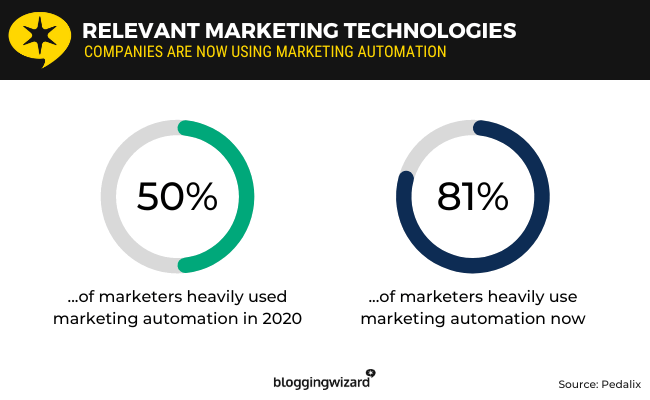
Marketing automation is less used by companies whose marketing budgets are less than $107,000, which is arguably the group who should be using this technology the most as they have less marketing personnel.
Only 59% of these companies use marketing automation, though this is a 15% increase from the previous year’s 44%.
Technologies more valued by smaller companies include customer relationship management (89%), email marketing (86%), search engine marketing (83%), digital analytics (67%) and content management (72%).
Source: Pedalix
5. 64% of B2B companies say marketing automation improves efficiency of all processes
Pedalix surveyed 460 B2B companies on marketing automation.
When asked about the ways in which marketing automation benefits their companies, 64% voted “more efficient processes” as being a “great benefit” of marketing automation.
32% found this to be a medium benefit while 4% think it’s a minor benefit.
Astonishingly, 0% don’t think this is a benefit at all.
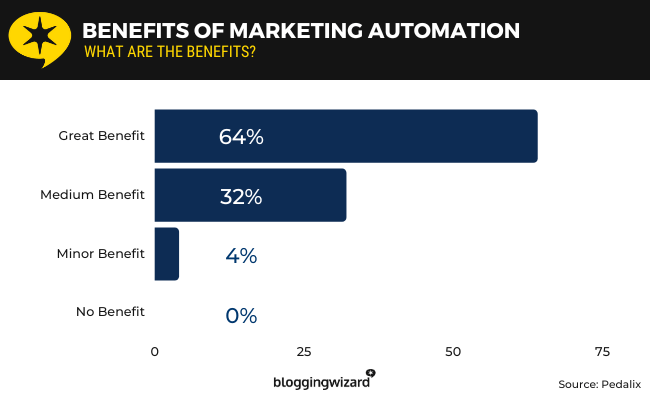
Other top benefits included personalized communication (54%), more conversions (53%), saving time on repetitive tasks (51%), and higher quality of leads and contacts (50%).
Less relevant benefits included a higher number of website visitors (23%), better cooperation between marketing and sales (30%), merging data silos (32%), improved customer care and loyalty (34%), and a higher ROI of marketing efforts (38%).
Source: Pedalix
6. 62% of businesses report lacking a process for lead nurturing as a key online marketing challenge
When Pedalix surveyed 460 B2B companies, they asked companies to rate the challenges they face in online marketing as “big,” “medium,” “minor” or “no challenge.”
27% of businesses find “missing a process for systematic lead nurturing” a big challenge while 35% say it’s a medium challenge.
25% say it’s a minor challenge while only 13% say it’s no challenge.
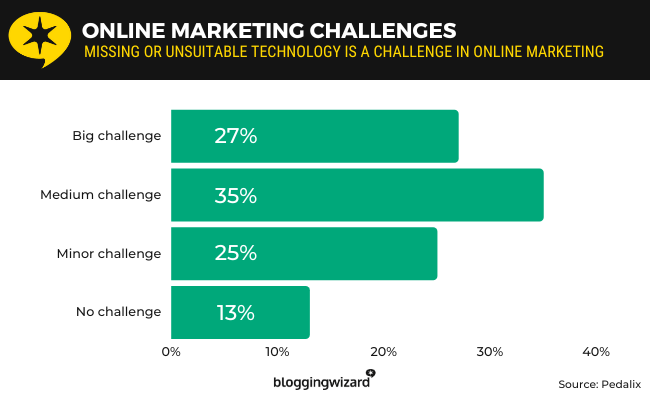
18% say missing or unsuitable technology is a big challenge in online marketing.
28% say this is a medium challenge, 29% say it’s a minor challenge and 26% say it’s not a challenge at all.
Source: Pedalix
Goal-based marketing automation statistics
7. 70% of B2B marketers say marketing automation helps with account-based marketing efforts
In Adobe’s The State of Marketing Automation report for 2023, the company asked respondents to rate how important marketing automation is for different areas of marketing on a scale of 1 to 5.
The following items were rated 4 or 5 by 70% of marketers:
- Account-based marketing
- AI assistance
- Audience creation and segmentation
- Completeness of automation
- Content personalization
- Data privacy controls
- Ease of use
- Email and cross-channel engagement
- Lead nurturing
- MarTech and CRM integrations
- Analytics
- Integrating workflows with sales
Source: Adobe
8. 98% of marketers name better ROI as a top marketing objective
In Adobe’s The State of Marketing Automation report, the company asked marketers to vote for their companies’ top marketing objectives.
98% voted for “improve marketing ROI.”
Other top-rated marketing objectives included “grow pipeline and revenue” (chosen by 97% of marketers), “provide great buyer/customer experiences” (chosen by 97%), and “keep pace with marketing tools and techniques” (chosen by 93%.
Source: Adobe
9. Only 15% of companies achieve high performance in marketing objectives
Adobe categorized the companies associated with 600 survey respondents in their State of Marketing Automation report into four groups based on performance against top marketing objects.
Only 15% of companies achieved high performance in their top marketing objects. The report referred to these companies as “leaders.”
16% had low performance. The report referred to these companies as “laggards.”
35% of companies, referred to as “upper majority performers” in Adobe’s report, have adopted marketing automation quite well but achieved less performance than leaders.
Source: Adobe
Marketing automation usage statistics
10. 26% of B2B companies handle marketing automation in house
When Pedalix surveyed 460 B2B companies, they asked what areas of marketing automation these companies may need external help with in the future.
26% said they handle everything in house, and 8% said they don’t use marketing automation at all.
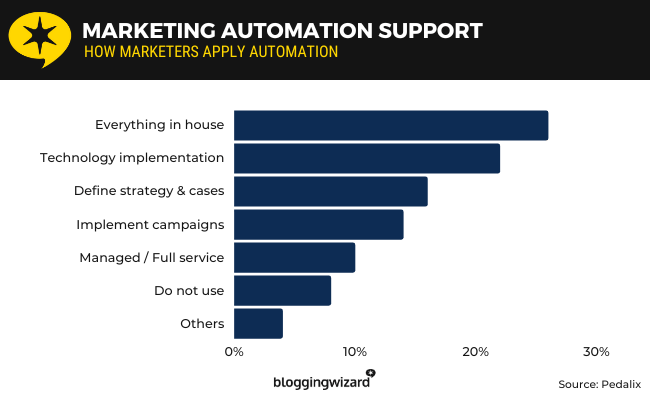
Of those that may need external help with marketing automation in the future, 22% said they may need help with technology implementation, 16% said defining strategies and use cases, and 14% said implementing campaigns.
10% said they’d prefer to use a full, managed service for marketing automation.
Source: Pedalix
11. 62% of B2B companies use conversion rates to track the success of marketing automation
In Pedalix’s survey, the company asked respondents to rate how relevant different performance metrics are to measuring the success of marketing automation.
62% find conversion rates to be the most relevant way to measure the success of a company’s implementation of marketing automation.
60% said the number of qualified leads, 57% said the number of leads generated and 51% said ROI.
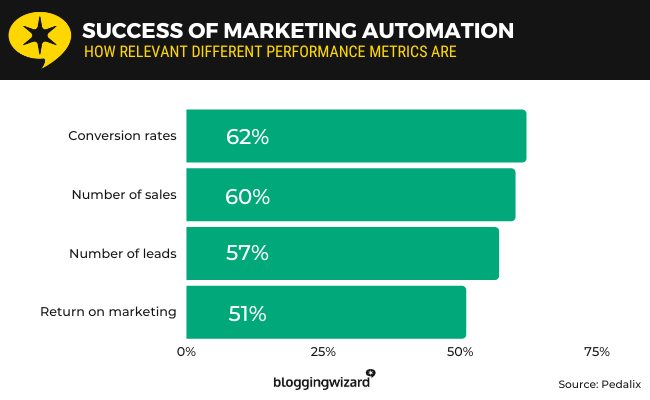
Least relevant were duration of the sales cycle (21%), social media engagement (24%), website engagement (33%), churn rate (34%) and email marketing metrics (38%).
Source: Pedalix
12. 71% of marketers are actively using marketing automation for email marketing
When Act-On surveyed over 160 B2B marketing professionals, they discovered that 71% use marketing automation for email marketing.
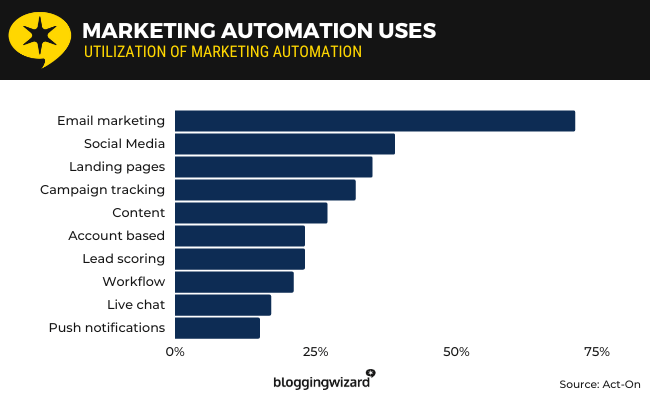
39% use it for social media management, 35% use it for landing pages while 32% use it for campaign tracking.
Other top uses include content management (27%), account-based marketing (23%), lead scoring (23%), workflows and automation visualization (21%), live chat (17%), and push notifications (15%).
Source: Act-On
13. 65% of B2B companies use marketing automation for opt-in and registration processes
In Pedalix’s 2022 Marketing Automation report, they asked 460 B2B companies about their use cases for marketing automation.
36% say they use it for opt-in and registration processes, and it’s a great benefit. 29% say marketing automation brings some benefit to this use case.
9% plan to implement marketing automation for these processes in the future while 23% don’t use marketing automation for this at all.
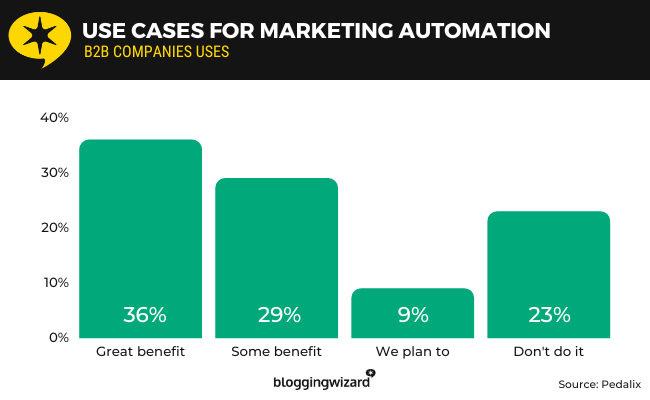
Other top use cases include personalization of content and products (26%), drip emails (25%), lead qualification (22%), social media scheduling (22%), welcome emails (21%), automated tasks, such as appointment scheduling and reminders (21%), and general lead nurturing (19%).
Source: Pedalix
14. 36% of marketers want to use marketing automation for social media management and email marketing
When Act-On asked over 160 B2B marketers how they plan on implementing marketing automation in the future, 36% voted for social media management and another 36% for email marketing.
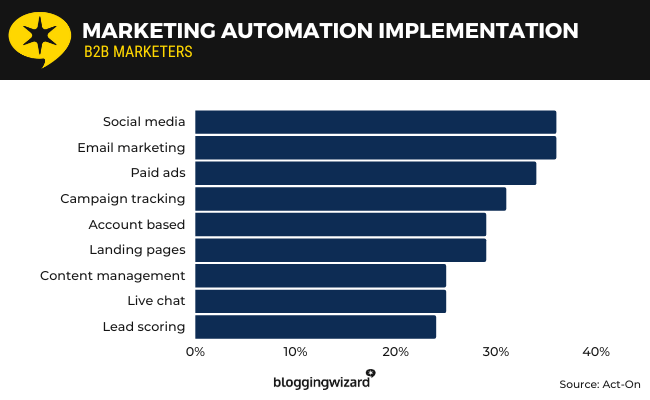
Other top answers included paid ads (34%), campaign tracking (31%), account-based marketing (29%), landing pages (29%), content management (25%), live chat (25%) and lead scoring (24%).
Source: Act-On
15. 81% of leading marketers use a single platform for marketing automation
Adobe’s report found that 81% of marketers who experience high performance metrics against key marketing objectives use a single marketing automation software application as opposed to the 19% who use two platforms.
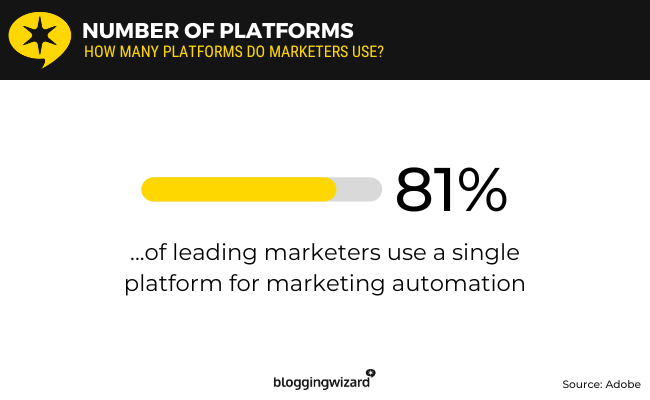
In contrast, 57% of low-performing marketers use a single platform where 43% use two.
Source: Adobe
16. 64% of leading marketers use sophisticated personalization strategies
64% of marketers use “high” personalization, according to Adobe’s report.
This includes customer-specific personalization, deep data, and all or most channels.
35% use medium personalization while 1% use low.
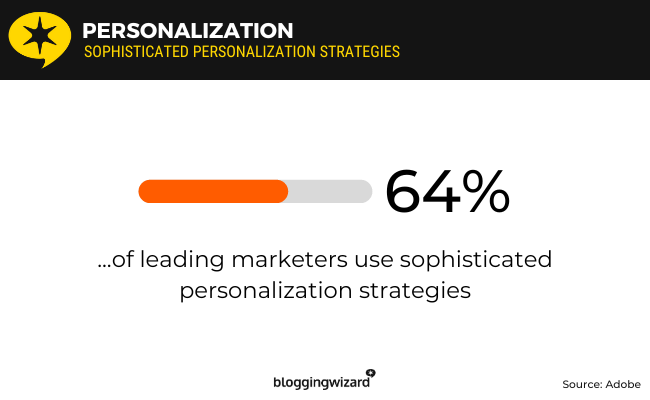
“Medium” personalization encompasses using targeted segments, working with moderate data and using multiple channels.
“Low” personalization entails targeting broad customer categories, collecting one or two key metrics, and using a single channel.
55% of poor-performing marketers use low personalization.
37% use medium personalization while only 7% use high.
Source: Adobe
17. 82% of B2B marketers do not have a customer data platform integrated with their marketing automation strategy
According to Adobe’s report, only 18% of B2B marketers have integrated marketing automation into their customer data platforms (CDPs).
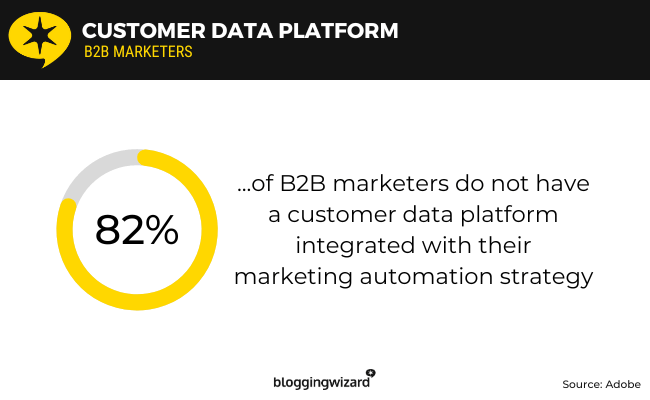
40% use marketing automation tools and a CDP, but they aren’t integrated.
42% use marketing automation but don’t yet have a customer data platform.
Source: Adobe
18. 95% of marketers track open rates over other email marketing metrics
According to HubSpot’s 2022 State of Marketing report, open rate is the most-tracked email metric. It’s tracked by 95% of marketers.
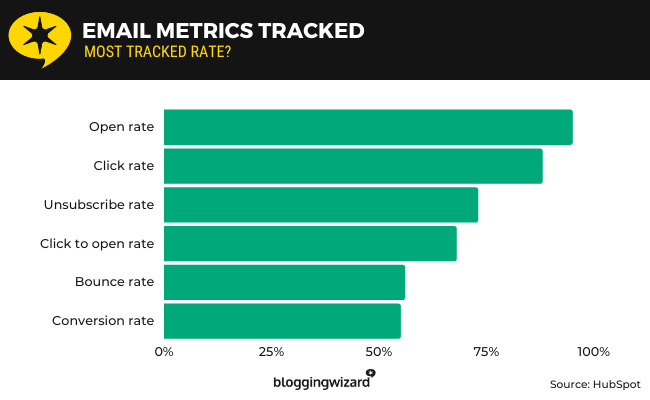
Other popular metrics to track include click rate (tracked by 88% of marketers), unsubscribe rate (73%), click-to-open rate (68%), bounce rate (56%) and conversion rate (55%).
Source: HubSpot1
19. 78% of marketers use automation for content planning
HubSpot’s 2023 Content & Media Strategy report revealed that 78% of marketers are using automation for content planning and marketing campaigns.
Source: HubSpot2
20. 54% of marketers never use or rarely use re-engagement email marketing campaigns
Re-engagement campaigns are special email marketing campaigns brands use to try and encourage cold leads to open emails, at the very least, click the links within them and convert from them.
However, when Litmus asked marketers about their use of re-engagement campaigns in the company’s 2021 State of Email Analytics report, 30% of marketers say they rarely use re-engagement campaigns while 24% don’t use them at all.
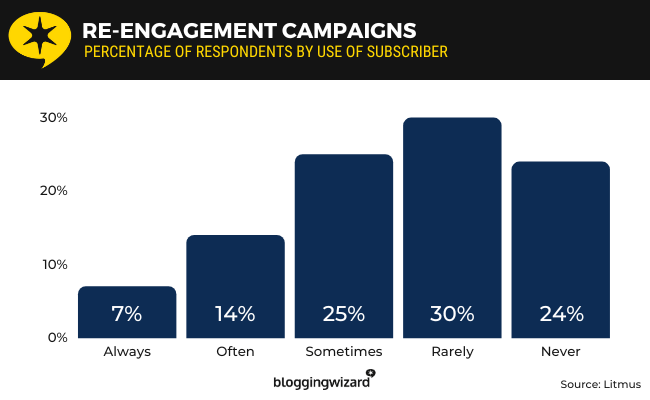
Only 7% use them as soon as leads go cold while 14% use them frequently and 25% use them every now and then.
Litmus also found that 53% of brands remove inactive subscribers from their mailing lists while 47% don’t bother.
38% of brands wait 5-12 months before removing inactive subscribers while 35% wait 13-24 months.
10% do so in less than four months while 17% remove subscribers who have been inactive for more than 25 months.
Source: Litmus
Marketing automation software statistics
21. 59% of marketing automation users feel they are not using their marketing automation tools to the fullest
Act-On asked over 160 B2B marketing professionals whether or not they feel as though they’re using their marketing automation tools to their fullest potential.
59% said “no” while 21% said “not sure.”
Only 20% said “yes.”
Act-On also asked these marketers about the barriers that prevent them from using their respective tools to their fullest potential.
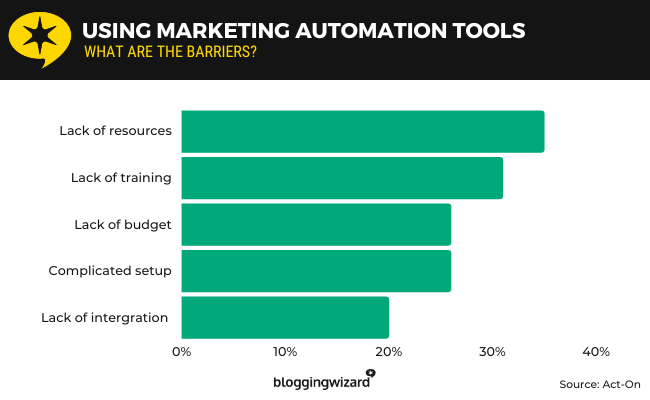
35% said lack of resources to manage, 31% said lack of training or a knowledge base, 26% said lack of a budget to maintain, 26% said their tools have complicated setups, and 20% said their tools don’t integrate with other important tools.
Source: Act-On
22. 40% of content planners use marketing automation tools to connect their content marketing channels
In HubSpot’s 2023 Content & Media Strategy report, they found that 40% of content planners use automation to integrate multiple content marketing channels together.
37% use marketing automation to target users with relevant content based on behavior, interest and preferences.
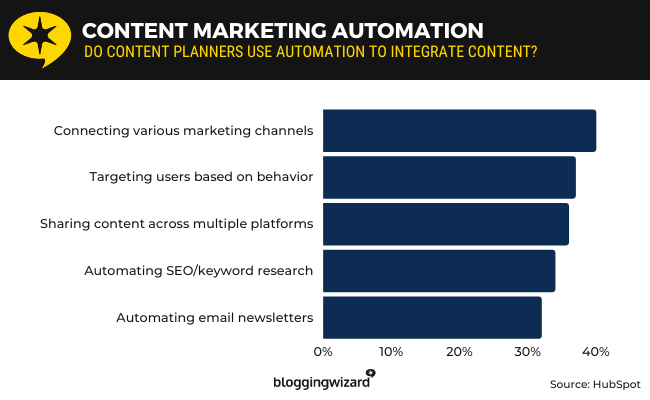
36% use automation tools to share content across multiple social media channels automatically.
34% of content planners use automation for SEO and keyword research as well as for generating content ideas.
32% use it to automate email newsletters for content marketing campaigns.
Source: HubSpot2
23. 58% of marketers say quality data is the most effective tactic amplified by a marketing automation platform
Act-On surveyed over 160 B2B marketing professionals.
When asked about the tactics marketing automation tools amplify, 58% voted for “quality data.”
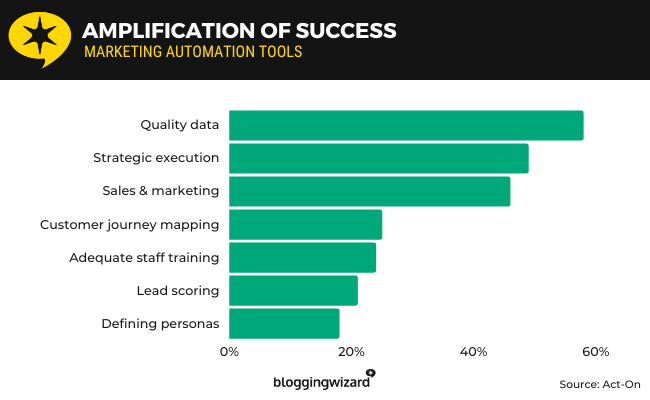
Other top answers included “strategic execution” (49%), “alignment of sales and marketing” (46%), “customer journey mapping” (25%), “adequate staff training” (24%), “lead scoring” (21%), and “defining personas” (18%).
Source: Act-On
24. 33% of B2B companies use Mailchimp
In Pedalix’s survey of 460 B2B companies, the company asked respondents about the marketing automation tools they use.
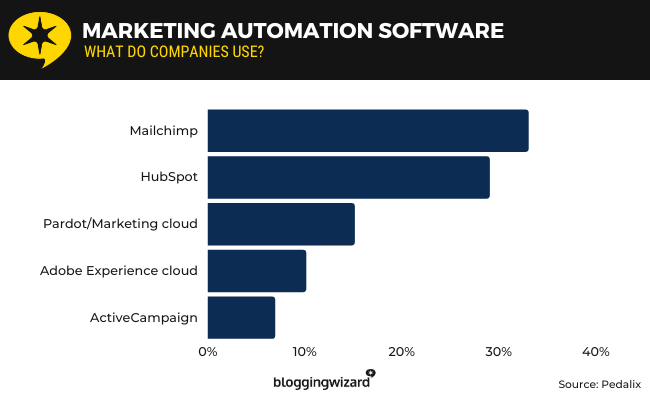
33% voted for Mailchimp, 29% for HubSpot, 15.1% for Salesforce, 10.1% for Marketo and 6.9% for ActiveCampaign.
Source: Pedalix
25. 61% of marketers use Google Analytics to track social media metrics
In HubSpot’s State of Marketing report for 2022, the company asked marketers about the tools they use to track social media metrics.
61% use Google Analytics as opposed to a dedicated social media analytics tool.
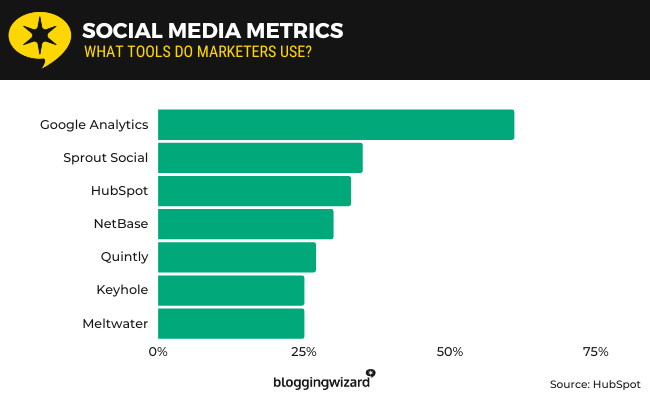
35% use Sprout Social, 33% use HubSpot and 30% use NetBase.
Source: HubSpot1
26. 62.1% of marketers use Google Analytics to track email metrics
Litmus’ 2021 State of Email Analytics report found that 62.1% of marketers use Google Analytics as an email analytics tool.
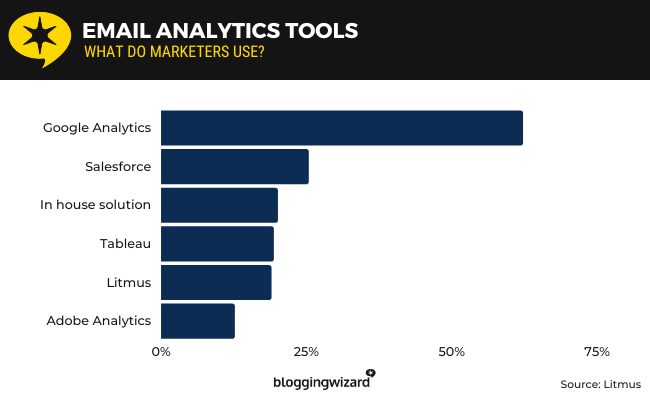
25.3% use Salesforce, 20% use an in-house solution, 19.3% use Tableau, 18.9% use Litmus and 12.6% use Adobe Analytics.
Source: Litmus
Marketing automation statistics sources
Final thoughts
That concludes our list of the latest marketing automation statistics.
These statistics prove that marketing automation is more than just a trend. It’s a sophisticated type of technology that’s helping businesses around the world become more efficient, earn more revenue and spend less on expenses.
Some of the more useful marketing automation stats on this list reveal how companies use marketing automation as well as how they track performance.
It also has key data on marketing automation tools, including tools that can be used for marketing automation.
Most importantly, some of the stats on this list show how smaller companies are not implementing marketing automation as much as larger companies are.
While this certainly could be due to the fact that smaller companies have smaller budgets to work with, it doesn’t change the fact that smaller companies stand to benefit the most from marketing automation as they have less personnel to work with.
Mailchimp, HubSpot and Salesforce are popular marketing automation tools used by successful companies globally, but it’s best to use tools that suit your organization’s needs.
Start recording key performance metrics if you aren’t doing this, yet.
Research metrics your organization falls short in to determine what sort of marketing automation tools you should look into.
Be sure to include the articles below in your research.
For additional reading:

